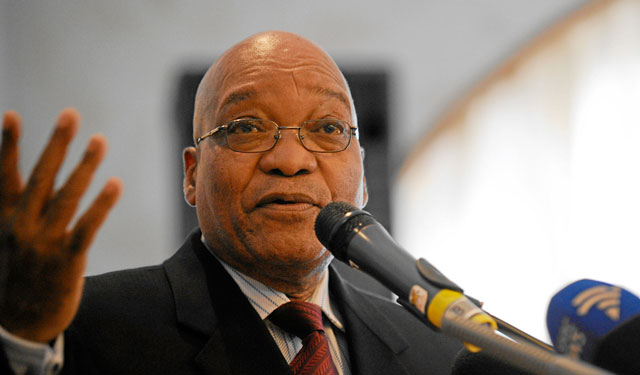
Allegations of treason, espionage and revolutionary plots to topple President Jacob Zuma are stoking a no-holds-barred fight between senior police officers for control of the nation’s security apparatus.
Squaring up in the courts and the media are officers in charge of probing police corruption, including Robert McBride, the head of the Independent Police Investigative Directorate, against others such as the bosses of the elite unit known as the Hawks.
Each side moved to file charges against the other this week amid accusations ranging from corruption to treason. The Hawks spearheaded the drive to charge finance minister Pravin Gordhan, who’s feuding with Zuma over the affordability of nuclear power plants and the management of state companies.
“There are people in some of these security agencies who want to arrest state corruption and the abuse of state resources, but there are also those who are part of the patronage faction who want to ensure the police service doesn’t function effectively,” Pierre de Vos, a professor of Public law at the University of Cape Town, said by phone on Thursday.
Key to the fray is Zuma, 74, who was head of ANC intelligence operations during the fight against apartheid. He faced unprecedented calls by several ministers in the ruling party’s national executive committee last month to quit. Compounding his woes are a top court ruling that he violated his oath of office by refusing to repay taxpayer funds spent on upgrading his private home and the ANC’s worst electoral performance in local elections in August.
His government’s “security cluster” of police, justice and intelligence officials includes Hawks head Berning Ntlemeza, who slammed prosecutors last month for dropping charges against Gordhan. The finance minister’s supporters say he’s being targeted because he’s leading the fight against what is known as “state capture”, or the influence of private interests over government policy.
“Robert McBride in his position as head of IPID has consistently come into conflict with the security cluster, which in its broadest sense, is generally perceived to be close to Jacob Zuma,” Nic Borain, a Cape Town-based adviser to BNP Paribas Securities South Africa, said by phone on Wednesday. “It’s impossible to avoid the narrative that McBride is the unlikely hero of a fight to free the capture of agencies gathered around the security cluster.”
The latest blow came on Tuesday when the Hawks branch in Gauteng, South Africa’s richest province, opened a court case alleging that McBride, investigator Paul O’Sullivan and others met clandestinely on 3 December to hatch a plot against the government. McBride said the case was brought hours after Ntlemeza was questioned about an investigation into charges of corruption and defeating the ends of justice.
High treason
“The meeting of 3 December 2016 was meant to concretise and put in motion a plan to destabilise the security forces of the country and to oust the president of the country through popular revolt,” the head of the Hawks in Gauteng province, Prince Mokotedi, said in his affidavit. “It is my submission that the group knowingly and actively participated in the plan to commit high treason, intimidate and harass senior officials and to ignite a revolution.”
McBride responded at a press conference in Pretoria by accusing the Hawks of “fabricating cases against innocent people instead of fighting crime, which threatens our democracy”.
McBride only returned to his position as head of the police complaints division in September after the nation’s top court set aside his suspension in 2015 by police minister Nathi Nhleko. That month he said South Africa was “turning into a mafia state.”
Control of police investigations may be key to Zuma’s future. He’s currently fighting a lawsuit filed by the main opposition Democratic Alliance to reinstate 783 graft charges that were dropped in 2009 just before he became president.
Zuma’s also contesting a directive from the nation’s former graft ombudsman that the chief justice appoint a judicial commission on “state capture” to investigate whether he allowed members of the Gupta family, who are his friends and in business with his son, to influence cabinet appointments and the awarding of state contracts.
The police wars mirror the intensifying faction fights inside the ANC, according to De Vos.
“It’s really about the patronage politicians and those who protect them and then on the other side politicians who want the state agencies to be protected and ensure they work because it is important for the constitution and the democracy,” he said. — (c) 2016 Bloomberg LP




